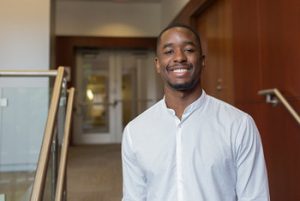Xavier Bonner is a doctoral student in biochemistry and biophysics. While an undergraduate student at Morehouse College, he participated in a research program co-sponsored by the Biophysical Society and UNC-Chapel Hill. “This experience not only cemented my dedication to attaining a Ph.D. in biochemistry but also developed my passion for solving problems we face in the biochemistry/biophysics field,” he says. Bonner serves as the first president of the student-led Society for Black Biomedical Scientists at UNC-Chapel Hill.
 What made you choose UNC-Chapel Hill when deciding on a program/place to study?
What made you choose UNC-Chapel Hill when deciding on a program/place to study?
UNC-Chapel Hill first got on my radar as a viable graduate school home in the summer of 2017, when I participated in the Biophysics Summer Research Program. During that summer, my research project entailed building proteins with my computer and assessing their stability under certain conditions. This experience not only cemented my dedication to attaining a Ph.D. in biochemistry but also developed my passion for solving problems we face in the biochemistry/biophysics field. Reflecting back to that time, I am quite happy about the progress I have made towards becoming an independent scientist and attribute much of my success at this level to those who helped me get to where I am now. Also, it doesn’t hurt that UNC-Chapel Hill has a great basketball culture, which was a priority for my graduate school selection.
Tell us about your research.
I study the molecular differences that allow certain HIV-1 viruses to better infect particular cells as opposed to other cells. When someone first becomes HIV-1 positive, only a select few HIV-1 virus strains are able to replicate in cells to produce more viruses. However, over time, HIV-1 evolves to be more capable of replicating in cells and even can expand its host cell range to cells that it initially could not infect. Of course, this is an unfortunate circumstance and I have empathy for those who are struggling with this disease; however, I find the molecular components of HIV-1 interesting because they work together to orchestrate a series of coordinated events and attacks that destroy cells.
How have you built community as a graduate student at Carolina?
Building a community has always been important to me since I began my graduate school education here at
Carolina. I first began my participation in the Carolina community by attending events hosted by the Black Graduate and Professional Student Association (BGPSA). This allowed me to meet students like me. I felt so supported that I ended up joining the BGPSA executive board this year to help evoke change at Carolina. I also felt that there were not many graduate students in the biomedical field that participated in this organization. I then started a new organization with other graduate students in the biomedical field. The Society for Black Biomedical Scientists (SBBS) aims to serve Black researchers in the biomedical field through professional development, outreach and social engagement in order to create a pipeline of African American researchers. We are looking to take this organization beyond Carolina so that we can attract biomedical researchers from all over the country.
What are you hoping to accomplish with your Carolina degree?
This question always takes me back to when I first decided to pursue a career as a scientist. The summer before my first year at Morehouse College I watched “Rise of the Planet of the Apes,” where James Franco starred as a researcher who developed what he thought was a cure for his father’s Alzheimer’s ailment. Looking back, this movie was not all that great, but for the next week I fantasized about what it would be like to lead a research team that discovered a cure for a major disease. In reality, it is rare that someone identifies a cure for a disease; however, I would like to lead a research team at a privatized corporation that focuses on curative methods for autoimmune diseases. I would like to begin to work on autoimmune diseases because I find it fascinating how cells are reprogrammed to attack other healthy cells.
